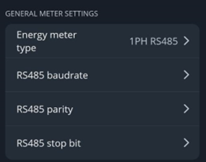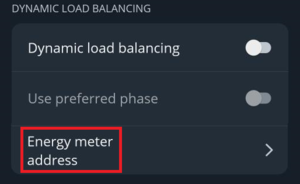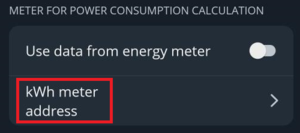Difference between revisions of "Chint settings"
From Wiki
| Line 23: | Line 23: | ||
| style="padding: 8px;" | 1 | | style="padding: 8px;" | 1 | ||
|} | |} | ||
| − | ==== How to configure Smart energy meter in mobile application ==== | + | ==== How to configure Smart energy meter in mobile application ==== |
| − | ''Note: Users could use two meters with different addresses. Additionally, there will be settings for these energy meters in the installer menu (these settings are the same for both energy meters).'' | + | ====''Note: Users could use two meters with different addresses. Additionally, there will be settings for these energy meters in the installer menu (these settings are the same for both energy meters).''==== |
| − | 1. Make sure you have updated mobile application and firmware version of the charger to the latest. (←[[Firmware]] and [https://apps.apple.com/lt/app/teltonika-energy/id1618750750 iOS] / [https://play.google.com/store/apps/details?id=com.teltonika.ems.ev&hl=en&gl=US Android]). | + | 1. Make sure you have updated mobile application and firmware version of the charger to the latest. (←[[Firmware]] and [https://apps.apple.com/lt/app/teltonika-energy/id1618750750 iOS] / [https://play.google.com/store/apps/details?id=com.teltonika.ems.ev&hl=en&gl=US Android]). |
| − | 2. Go to installer menu in your application and set general parameters from table above | + | |
| + | 2. Go to installer menu in your application and set general parameters from table above. | ||
| + | |||
| + | 3.To get data from energy meter, you will need to set the energy meter address in the “Dynamic load balancing” section. | ||
| + | |||
| + | 4. Also, you will need to set the kWh meter address in the “Meter for power consumption calculation” section if you want to use it. | ||
| + | |||
[[file:General_meter_settings.png|alt=|left|frameless|]] | [[file:General_meter_settings.png|alt=|left|frameless|]] | ||
| − | + | ||
| + | |||
[[file:Dynamic_load_balancing.png|alt=|left|frameless|]] | [[file:Dynamic_load_balancing.png|alt=|left|frameless|]] | ||
| − | + | ||
| − | [[file:Meter_for_power_consumption_calculation.png|alt=|left|frameless|]] | + | [[file:Meter_for_power_consumption_calculation.png|alt=|left|frameless|]] |
| − | To find out specific settings, you will need to read the energy meter's documentation. | + | |
| − | + | ||
| + | |||
| + | |||
| + | |||
| + | |||
| + | |||
| + | |||
| + | |||
| + | |||
| + | |||
| + | |||
| + | |||
| + | |||
| + | |||
| + | |||
| + | To find out specific settings, you will need to read the energy meter's documentation. [[Smart energy meters]] | ||
Revision as of 11:29, 3 September 2024
← Smart energy meters Chint settings.txt text · 2 KB
RS485 parameters for energy meter Chint DTSU 666; DDSU 666
Note: Energy meter parameters should match EVSE default parameters.
| RS485 parameter | EVSE default parameter value (configurable in mobile app) |
|---|---|
| Modbus adress | 1 |
| Baud rate | 9600 |
| Parity | None |
| Stop bits | 1 |
How to configure Smart energy meter in mobile application
1. Make sure you have updated mobile application and firmware version of the charger to the latest. (←Firmware and iOS / Android).
2. Go to installer menu in your application and set general parameters from table above.
3.To get data from energy meter, you will need to set the energy meter address in the “Dynamic load balancing” section.
4. Also, you will need to set the kWh meter address in the “Meter for power consumption calculation” section if you want to use it.
To find out specific settings, you will need to read the energy meter's documentation. Smart energy meters


